PAL Versions
Currently, no research indicates that the American and European English PC versions differ from one another. The changes made for the non-English PlayStation releases appear to be true even for their PC counterparts, but these versions are yet to be researched and compared in detail. Naturally, issues like the slowdown in European PlayStation ports are not present in the PC versions.
– NTSC versus PAL: Technical Stuff
– Starting the game
– Script Changes: English NTSC <-> English PAL
– Snowboarding
– Non-English Traits
NTSC versus PAL: Technical Stuff
Framerate
NTSC and PAL are analog television standards (wiki article). NTSC uses the 60Hz standard, which shows 60 frames per second. This standard is used in Japan, North America, parts of South America and others.
PAL uses the 50Hz standard which shows 50 frames per second. This standard is used in Europe, Australia, parts of South American and others.
In the context of video games this means that European game ports will usually play 1/6th slower than their Japanese/American counterparts. With the advent of digital television standards this problem is somewhat lessened, but the slower European ports remained a fact even during the PS2 era.
Final Fantasy VII for Europe is no exception. The slowdown remains true even for digital re-releases on services like the PlayStation Store.
Overall gameplay, including music, will play at 50Hz instead of 60Hz. FMVs remain the same length as the 60Hz originals by skipping frames and speeding up the music. The game’s timer, seen in the main menu, has not been adjusted and so it will actually take 1.2 real seconds for 1 second to pass in the European game’s timer.
One curiosity is that *some* sound effects appear to still play at a speed corresponding to 60Hz. In cases where sound effects are rather lengthy, like is often the case with summons, the sound and animation will go out of sync: The sound of a sword or a energy beam may be heard before it happens in the summon animation. This is very noticable when the final knight in Knights of Round deals the final blow, wherein the PAL version the sound of the blow comes before than the animation.
Image Ratio
The resolution of the NTSC game is 320×240 pixels, which nets the ratio at 4:3. This was slightly changed for PAL, where the resolution is instead 320×256, i.e. 5:4.
The NTSC game has black borders at both the top and bottom in the majority of gameplay. In PAL the image was pressed in height and the black borders became bigger.
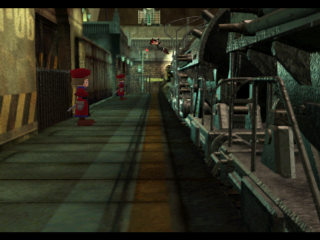

Further snapshots from the European game will not show this difference in ratio however, because the snapshot function in the pSX emulator ignores that the image has been pressed. Additional black borders have been cropped away.
Starting the game
The PAL version is notably slow with taking you to the New Game/Continue screen.
The English NTSC version had already slowed the process by adding the following screen, before the Squaresoft logo appears (the latter which the player at least can click past).
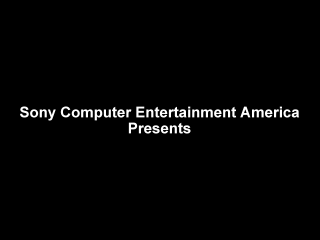
But for the PAL release another disclaimer, which the player can’t click past, was added. For the second message “Sony Computer Entertainment America” was naturally changed to “Sony Computer Entertainment Europe“.
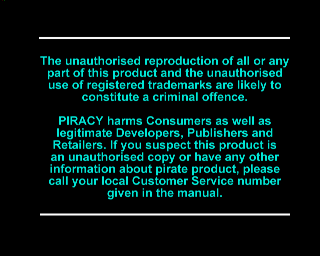
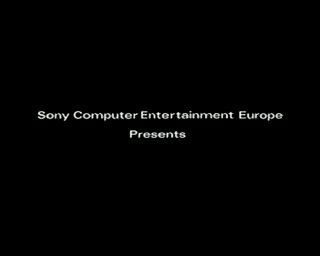
So when counting how long it takes to get to the New Game screen, when clicking past the Squaresoft logo as quick as possible, these are the times (roughly calculated):
Japanese: 20 seconds.
English NTSC: 30 seconds.
English PAL: 44 seconds.
Script Changes: English NTSC <-> English PAL
A few changes actually exist though none of the changes reflect a change from American English to British English. So far only the field script has been compared. Differences could still be discovered in battles, menus, FMVs etc.
English NTSC images to the left and English PAL images to the right.


“PlayStation” was changed to the more neutral “Console”.
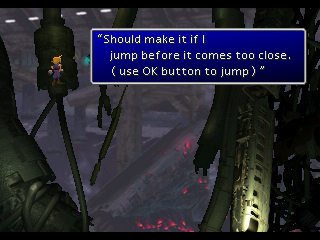
Why only one image? Because the difference here is so tiny that it can only be seen via a text editor. In the English NTSC game, there is one extra space after “Should make it if I “. This extra space was removed for English PAL. How…riveting.
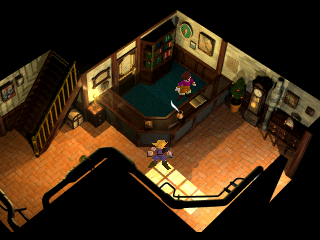


The second floor in English NTSC is named “Inn: 2f” in the same fashion as the PAL version.
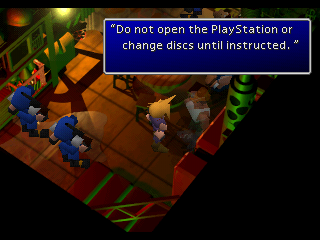
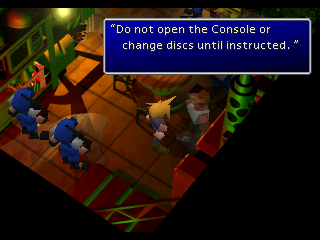
Same change from “PlayStation” to “Console” as it was in Beginner’s Hall.

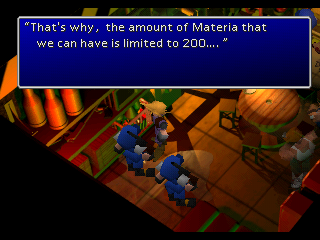
The third row of text was completely removed for PAL, maybe because it is slightly misleading. 200 materia is the total number of materia that can fit in the list of non-equipped materia, not the max amount that can be equipped.
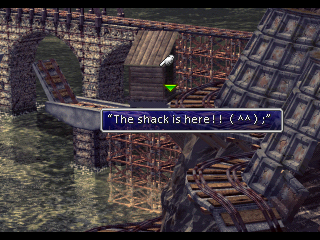

English NTSC, as well as the German and Spanish versions are the only ones to include the ” (^^); ” bit. For English PAL, English PC and the French versions the happy eyes were removed.
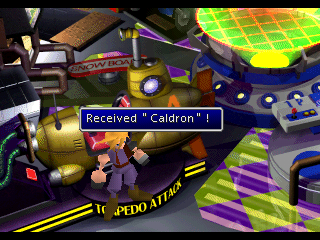
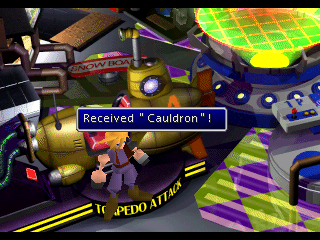
After your fifth successful submarine mission, the player receives a Cauldron. The misspelling “Caldron” was corrected for English PAL.
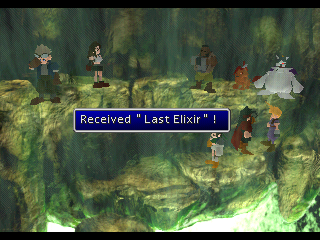
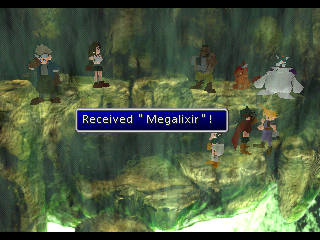
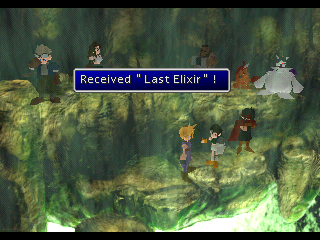
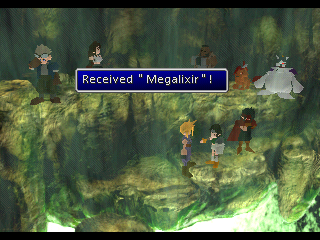
If you send Yuffie and/or Vincent to the right at the very first intersection and decide to not have Cloud go the same path, each will give you a Megalixir. The mistranslation “Last Elixir” is seen in other parts of both the North American and English European game, but this is the only spot where that mistranslation was corrected for English PAL.
The two receipt lines here are two distinct text entries in the data, so two lines were corrected here and not just one.
Snowboarding
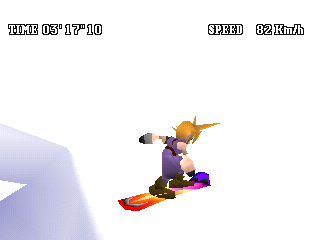
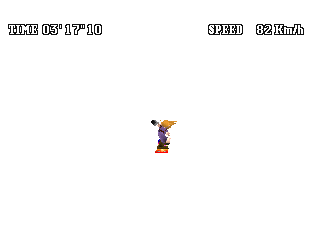
The PAL editions are exclusive to having the timer AND the speed number freeze just when Cloud snowboards off the edge. In all other versions the timer continues rolling and the speed quickly drops to zero.
The timer actually flows according to actual seconds, both here and in the storydriven snowboarding, just like in the NTSC releases.
Because of this the required intervals for achieving specific ranks in Time Attack mode have been fine-tuned to fit the European port’s slower gameplay. View the tables below to compare how the required times were changed.
| North American Version | |||
|---|---|---|---|
| Ranking | Course A | Course B | Course C |
| FAIL | 01’30″000 – Any Higher | 02’00″000 – Any Higher | 02’10″000 – Any Higher |
| POOR | 01’16″000 – 01’29″999 | 01’40″000 – 01’59″999 | 01’50″000 – 02’09″999 |
| AVERAGE | 01’05″000 – 01’15″999 | 01’20″000 – 01’39″999 | 01’35″000 – 01’49″999 |
| GOOD | 01’00″000 – 01’04″999 | 01’16″000 – 01’19″999 | 01’25″000 – 01’34″999 |
| VERY GOOD | 00’56″000 – 00’59″999 | 01’13″000 – 01’15″999 | 01’20″000 – 01’24″999 |
| EXCELLENT | 00’54″000 – 00’55″999 | 01’10″000 – 01’12″999 | 01’15″000 – 01’19″999 |
| SUPER | 00’52″000 – 00’53″999 | 01’06″000 – 01’09″999 | 01’10″000 – 01’14″999 |
| FREAK | Even Less – 00’51″999 | Even Less – 01’05″999 | Even Less – 01’09″999 |
| English European Version | |||
|---|---|---|---|
| Ranking | Course A | Course B | Course C |
| FAIL | 01’45″000 – Any Higher | 02’15″000 – Any Higher | 02’30″000 – Any Higher |
| POOR | 01’30″000 – 01’44″999 | 02’00″000 – 02’14″999 | 02’10″000 – 02’29″999 |
| AVERAGE | 01’18″000 – 01’29″999 | 01’45″000 – 01’59″999 | 01’54″000 – 02’09″999 |
| GOOD | 01’12″000 – 01’17″999 | 01’31″000 – 01’44″999 | 01’42″000 – 01’53″999 |
| VERY GOOD | 01’07″000 – 01’11″999 | 01’29″000 – 01’30″999 | 01’36″000 – 01’41″999 |
| EXCELLENT | 01’05″000 – 01’06″999 | 01’27″000 – 01’28″999 | 01’30″000 – 01’35″999 |
| SUPER | 01’02″000 – 01’04″999 | 01’19″000 – 01’26″999 | 01’24″000 – 01’29″999 |
| FREAK | Even Less – 01’01″999 | Even Less – 01’18″999 | Even Less – 01’23″999 |
Non-English Traits
Peculiarities of the German, French and Spanish releases, which were first seen in the PlayStation release but also remained for the PC editions.
On the 62nd floor of Shinra HQ Domino wants you to guess the password. Out of the six options, only four are randomly selected as the correct answer in the Japanese and English versions. However in the non-English releases, “MAKO” is always the only correct answer.
Interestingly, Domino’s responses for when any of the other three options are correct (BEST, KING & BOMB) were translated and exist thusly as unused text in the game data.
Unlike all other releases, none of the keys are broken. In the Japanese and English versions piano keys were broken in relation to the hint in Hojo’s letter as to where the second dial number could be found. In German, French and Spanish the hints no longer reflect the piano keys and so the broken keys were fixed.

